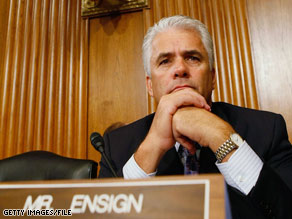
It seems there are so many sex scandals among politicians that it’s become rather blase. Oh, another Congressman had an affair. Ho-hum. A few politicians resign, but most stick it out…and a good share get re-elected.
I got to wondering if there were really as many sex scandals as it seemed. So I put together a list going back to the 1980s, with thanks to Google (there are already a number of lists out there). It appears that Republicans–you know, those family values folks–have a sizable lead in the number of scandals. But when it comes to magnitude, the Democrats excel. They have three whoppers that trample in the dust anything done by Republicans: Bill Clinton, John Edwards, and Gary Hart. Who, among the GOP philanderers, even comes close?
I wonder if the frequency of sexual affairs among politicians is any greater than the frequency in the general population. Probably much less than among celebrities, but higher than among clergy.
Well anyway, let’s take a look at my lists.
Republican
2011: Arnold Schwarzeneggar. Governor of California. Affair, and child, with a staffer.
2011: Chris Lee. New York Congressman. Sent shirtless photos over the internet. Resigned.
2010: Mark Sauder. My own Indiana Congressman. Affair. Resigned.
2009: Mark Sanford. South Carolina governor. Affair with his Argentine soul-mate.
2009: John Ensign. Nevada senator. Affair with a staffer, with money payoffs.
2008: Vito Fossella. New York Congressman. Affair and child.
2007: Larry Craig. Idaho senator. Arrested for homosexual conduct.
2007: David Vitter. Louisiana Congressman. Prostitution scandal.
2006: Mark Foley. Florida Congressman. Lewd texting to interns.
2002: Rudy Giuliani. New York City major. Cheated on his wife with his current wife, Judith Nathan.
1998: Bob Llivingston. Affair. Stepped down as House Speaker
1998: Newt Gingrich. Cheated on his wife with his current wife.
1998: Helen Chenoweth. Idaho Congresswoman. Admitted six-year affair with a married rancher in the 1980s.
1998: Henry Hyde. Illinois Congressman. Admitted an affair decades earlier.
1998: Dan Burton. Indiana Congressman. Admitted an affair which resulted in a child in 1983.
1995: Bob Packwood. Oregon Congressman. Many accusations of sexual harrassment, abuse, and assault. Resigned.
1991: Chuck Robb. Virginia senator. Extramarital affair.
Democrat
2011: Anthony Weiner. New York Congressman. Sent lewd photos of himself over Twitter.
2010: Eric Massa. New York Congressman. Sexual misconduct with male staffers. Resigned.
2008: David Patterson. New York governor. Admitted to earlier affairs.
2008: Elliott Spitzer. New York governor. Prostitution scandal. Resigned.
2008: Tim Mahoney. Florida Congressman. Multiple affairs.
2007: John Edwards. Affair which resulted in a child.
2006: Don Sherwood. Pennsylvania Congressman. Affair with a 29-year-old.
2004: James McGreevey. Governor of New Jersey. Admitted to a gay affair. Resigned.
2001: Gary Condit. California Congressman. Affair with an intern.
1998: Bill Clinton. President. Sex with an intern.
1989: Barney Frank. Massachusetts Congressman. Gay relationship.
1987: Gary Hart. Senator. Affair while running for president. Resigned.
There, isn’t that edifying?




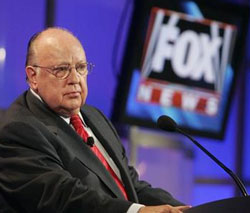 Roger Ailes, who basically created the Fox News Channel, is the subject of two major profiles which have gotten a lot of buzz.
Roger Ailes, who basically created the Fox News Channel, is the subject of two major profiles which have gotten a lot of buzz.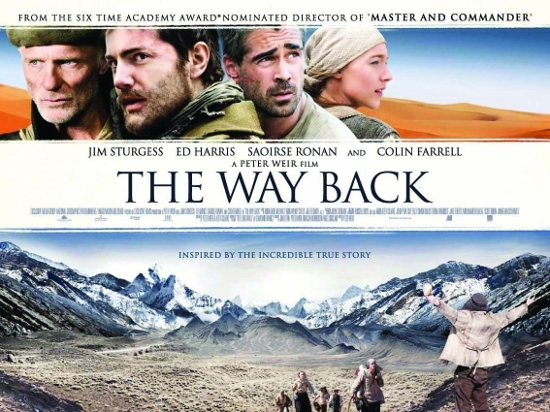
 Last Wednesday I heard Annie Jacobsen talk about her book, “Area 51: An Uncensored History of America’s Top Secret Military Base,” with Jon Stewart on the Daily Show. Then, the next morning, I heard her on Morning Jo’. I was intrigued. I downloaded a 30-page sample onto my Nook, was hooked, and then bought and downloaded the entire book. Four days later, and just six days after the book was released, I’m finished.
Last Wednesday I heard Annie Jacobsen talk about her book, “Area 51: An Uncensored History of America’s Top Secret Military Base,” with Jon Stewart on the Daily Show. Then, the next morning, I heard her on Morning Jo’. I was intrigued. I downloaded a 30-page sample onto my Nook, was hooked, and then bought and downloaded the entire book. Four days later, and just six days after the book was released, I’m finished.

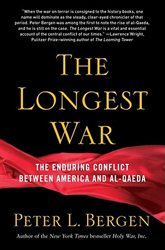 I loved this book. I’ve read a number of books about the Afghanistan and Iraq wars, and most have been very good. “The Longest War: The Enduring Conflict Between America and Al-Qaeda,” published in January 2011, represents extensive reporting of the whole history of Al Qaeda and Osama bin Laden. Bergen, a TV and print journalist, was the CNN producer who arranged bin Laden’s first interview with the Western press back 1997. He’s been working the story ever since.
I loved this book. I’ve read a number of books about the Afghanistan and Iraq wars, and most have been very good. “The Longest War: The Enduring Conflict Between America and Al-Qaeda,” published in January 2011, represents extensive reporting of the whole history of Al Qaeda and Osama bin Laden. Bergen, a TV and print journalist, was the CNN producer who arranged bin Laden’s first interview with the Western press back 1997. He’s been working the story ever since.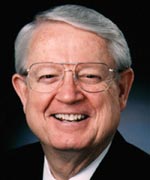 I occasionally feel bothered by our efforts, as the Christian church, to adopt the world’s ways in order to appeal to the world. There are lots of advantages to doing that, and yet, I don’t know, it sometimes just doesn’t feel right. Maybe I’m just getting old and allergic to edgy.
I occasionally feel bothered by our efforts, as the Christian church, to adopt the world’s ways in order to appeal to the world. There are lots of advantages to doing that, and yet, I don’t know, it sometimes just doesn’t feel right. Maybe I’m just getting old and allergic to edgy.